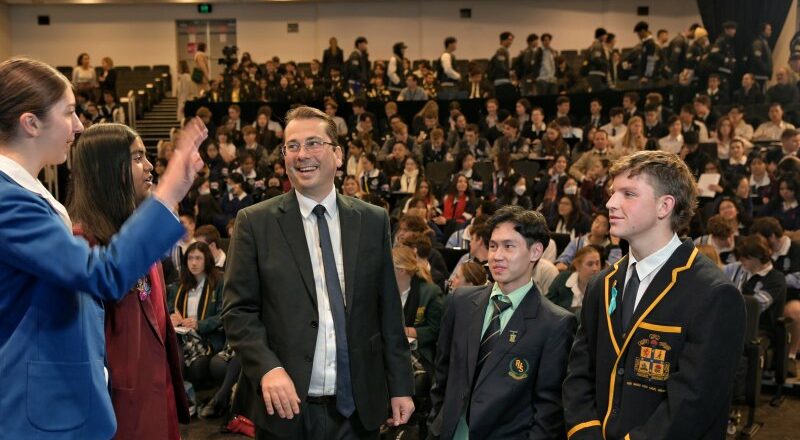‘Difficult, dull and boring’: The HSC subject that students are abandoning
Save articles for later
Add articles to your saved list and come back to them any time.
The study of economics has a serious image problem. Just 8 per cent of all year 12 students studied economics in the Higher School Certificate last year, compared with almost 30 per cent three decades beforehand.
High school students find the subject uninteresting while university students perceive it as abstract, difficult, dull and boring, not relevant to the real world and lacking an ethical dimension, research has found.
UBS Chief Economist George Tharenou chats to HSC economics students.Credit: Nick Moir
Investment bank UBS’s chief economist George Tharenou believes those sorts of perceptions were unwarranted and said economics should be booming in popularity with socially engaged Gen Z school students.
“If you want to make a difference in life, and this is the social agenda of younger people, wanting to be differentiated, have a voice, be heard … the key public policy debates are driven by economists,” Tharenou said.
Rising interest rates have put economics in the spotlight, but he said students had not twigged to the fact that a career in the industry was more than just staring at spreadsheets.
“The opportunity to make change for a good cause is new, but I don’t think people have quite got that,” he said.
RBA governor Philip Lowe has been in the spotlight since interest rates started rising. Discussion about inflation, interest rates and a housing crisis have all sparked interest in economics.Credit: Alex Ellinghausen
“I think economists have become the preeminent voice for social issues … That was not the case in prior decades where economists were technical about economic data points.”
“Having quality economists in the marketplace, not just at banks, but across broader public policy areas whether that’s government, treasury … it will improve outcomes for society.”
In 1992, 30 per cent of all HSC students enrolled in economics but that figure slipped to just 8 per cent of students last year. It is part of a long-running trend of students opting for the business studies course, which is perceived as easier.
The cohort studying economics 30 years ago was half boys and half girls, but now male students make up two-thirds of enrolments.
Reserve Bank of Australia research released in 2021 found high school students believed the subject was uninteresting while others had less favourable views.
“For students at Australian universities at least, economics is generally viewed as abstract, difficult, dull and boring, not relevant to the real world, lacking an ethical dimension, and not obviously associated with a high-profile profession or clear career path,” the report said.
Boys from schools in rich areas were more likely to study the subject; schools in regional areas were less likely to offer economics compared to metropolitan schools.
Economics and Business Educators Board of NSW vice president Wendy Mockler said elsewhere in the world education systems had broadened the subject to include contemporary issues and behavioural economics.
The report found that university students see economics as lacking relevance and an ethical dimension.Credit: James Brickwood
“Economics in its current form has not been able to sell itself – it has had some issues around its image,” she said.
“The research shows us that students are interested in topics such as climate change, the distribution of wealth – they want a problem and issues-based curriculum.”
Tom Hitchens, 17, from The Scots College in Bellevue Hill attended a HSC economics conference hosted by UBS this month. He chose to study economics for the HSC because he was fascinated with how everything in society is affected by the economy and was contemplating a career as a fund manager.
“I find it quite fascinating about how it all interlocks and how the operations of one thing impacts on another and how it all circulates between each other,” he said.
After studying the topic for more than a year, he said the Reserve Bank was doing an okay job when it came to monetary policy.
“Inflation is probably something which needs to be a bit better at the moment, but yeah, it’s hard,” he said.
Nicola Felea, 17, from St Luke’s at Dee Why, said learning about inflation educated her about many other aspects of society.
“Inflation and how that impacts our spending and wages and jobs – it is all a big system and it is really good to know how our society operates,” she said.
The Morning Edition newsletter is our guide to the day’s most important and interesting stories, analysis and insights. Sign up here.
Most Viewed in National
From our partners
Source: Read Full Article




